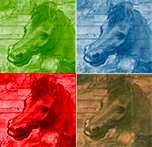Type: 2D/3D Analysis
Overview
The team at RWTH Aachen University focuses on instrument development and measurement methodology for non-destructive testing of objects of art and cultural heritage by Nuclear Magnetic Resonance (NMR) methods. NMR is used to determine molecular structures from chemical shift spectra in chemical analysis and to produce slice-selective images by diagnostic Magnetic Resonance Imaging (MRI) in hospitals. The NMR-MOUSE measures the same parameters as an MRI machine. However, the sensor is portable and provides single-sided access to investigate arbitrarily sized objects non-destructively at the site.
Technical details
The maximum depth of measurement for the NMR-MOUSE is 25 mm inside the object without physical contact. The maximum depth resolution is about 5 μm depending on the model of the sensor. With the NMR-MOUSE relaxation rates and signal amplitudes are measured in different types of experiments that give information about the stratigraphy of the object in terms of hydrogen density, volumetric moisture content, translational diffusion coefficient, and molecular mobility corresponding to elasticity or viscosity. 2D relaxation correlation maps can also be measured to characterize the pore structure in fluid-containing porous objects. The device can be mounted on a precision sliding table controlled by a stepper motor that positions the device for measurements at different depths. For painted walls and easel paintings horizontal the sensor is shifted horizontally while it is shifted vertically for samples that are placed on top of the device. All the equipment may be taken to the measurement site by plane, train and other public transport.
Further readings
- B. Blümich, J. Perlo and F. Casanova, Prog. Nuc. Magn. Reson. Spectr. 2008, 52, 197 – 269.
- B. Blümich, F. Casanova, J. Perlo, F. Presciutti, C. Anselmi and B. Doherty, Accounts of Chemical Research, 2010, 43, 761–770.
- D. Capitani, V. Di Tullio, N. Proietti, Prog. Nuc. Magn. Reson. Spectr. 2012, 64, 29 – 69
- B. Blümich, S. Pohlmeier, W. Zia Compact NMR, De Greuyter 2014
- K. Fukunaga, T. Meldrum, W. Zia, M. Ohno, T. Fuchida, B. Bluemich, Digital Herit. Int. Congr 2013, 1, 81–88.
Providers
MOLAB Germany: RWTH
